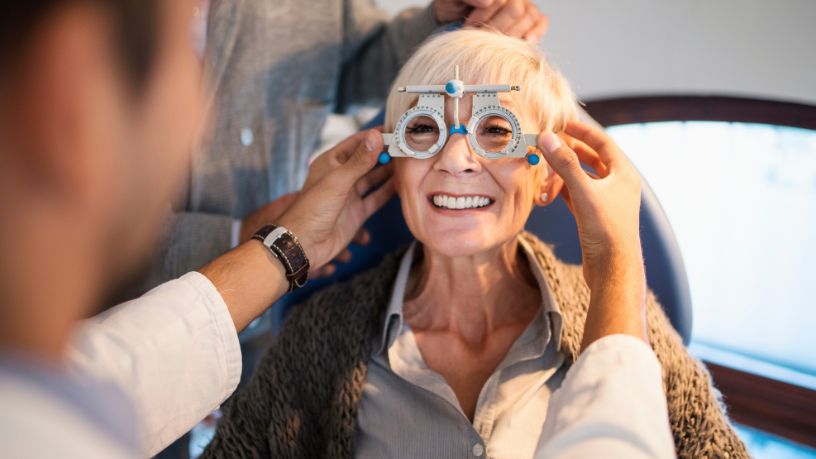Routine eye checks can detect eye problems and other health conditions at an early stage.
On this page
Key takeaways
Adults and children should have regular eye exams throughout life, even if they have no symptoms.
If your optometrist finds signs of another potential health issue, they may refer you to see a GP or specialist for further tests.
Did you know eye checks don't just detect poor or changing vision?
Just like having your teeth cleaned at the dentist every 6 months or visiting your GP for an annual health check, routine eye exams are an important part of staying healthy.
Eye exams can pick up much more than long or short-sightedness; they can detect eye problems and other health conditions, such as diabetes or heart disease.
Why are eye tests important?
One of the reasons that eye checks are so important is that many eye and vision problems have no obvious signs or symptoms. As a result, people are often not aware that a problem exists until they have an eye exam.
An early eye diagnosis and treatment of eye and vision problems are important for maintaining good vision and eye health and preventing vision loss, so regular checks are crucial.
Vision problems an eye check may detect
There are many eye diseases and conditions that may show up in a routine eye exam.1 These include:
- dry eyes: This is becoming a more common issue as our use of devices increases.
- pterygium: This condition is associated with excess UV exposure, and is a growth of tissue across the cornea (the clear front part of the eye).
- cataracts: A clouding of the normally clear lens of your eye.
- glaucoma: A group of eye conditions resulting in optic nerve damage which may cause loss of vision.
- macular degeneration: Age-related macular degeneration, a group of degenerative diseases of the retina, which is a leading cause of loss of vision in people aged 65 years and over.
- astigmatism: A common eye disorder in which the eye has trouble focusing light. Patients that have astigmatism can usually improve their vision by wearing glasses, contact lenses or by refractive surgery.
- diabetic retinopathy: Diabetic retinopathy (DR) is a condition associated with unstable or high blood glucose levels in diabetes. DR usually presents as retinal haemorrhages and other leakages from retinal blood vessels, with more advanced cases also exhibiting signs of new blood vessel growth in the retina.
Some of these conditions can occur at any age, while others are more common among older adults.
Although it is recommended to have your eyes tested every 2 years, if you are over the age of 65 or have a progressive eye disorder, it is usually recommended to have your eyes tested annually.
Book an eye test
Find and book your preferred spot at your local Bupa Optical store.
Other conditions that may be detected
- Retinitis pigmentosa: A group of genetic disorders that affect the retina's ability to respond to light.
- Keratoconus: A degenerative eye disorder that causes structural changes to the cornea.
- Presbyopia: A condition that generally begins to occur around age 45, when people experience blurred vision when reading, sewing, performing near tasks or working at the computer.
How eye checks can identify other health issues
Other conditions that may be detected by an eye check include:
- diabetes
- high blood pressure
- cardiovascular disease.
Your free Microvascular Health Assessment
A Microvascular Health Assessment (MHA) uses AI to predict the risk of developing cardiovascular disease within the next 5 years. MHA is now free for current Bupa Members aged 40 to 80 and can be added to your regular eye test.
Sometimes optometrists may see signs of more serious health problems, for example some brain tumours and cancers.
Optometrists use a technique called fundoscopy to look at the retina at the back of the eye. The optometrist may take photos of your retina, which can provide information about the health of the retina and becomes a record that can be referred to in the future.
Diabetes can cause day-to-day fluctuations in vision, which often settle when blood glucose levels become stable. An eye test can sometimes reveal changes in the retina's blood vessels, which can happen when diabetes remains undetected or is not managed well.
Likewise, heart and blood-vessel disease may also result in changes to the normal appearance of the retinal blood vessels; they may appear thinner than usual or vary in thickness. Bleeding or other suspicious signs can also sometimes be detected. If these problems show up during an eye test, your optometrist may inform your GP for further consultation and tests.
Eye checks for children
Regular eye checks are just as important for children as they are for adults. A child's learning and development, as well as their behaviour, can be affected by eye or vision problems.
Sometimes the signs of a vision problem in a child may be something that seems unrelated, such as being easily distracted or being a bit clumsy, or there may be no signs at all. Children should receive an eye test before they start school (or earlier if you are concerned or notice any problems), and then annually as they grow.
Generally, a comprehensive eye exam will include an eye health check. To be sure, simply ask your optometrist about your eye health the next time you're having your regular check-up.

At Bupa, trust is everything
Our health and wellbeing information is regularly reviewed and maintained by a team of healthcare experts, to ensure its relevancy and accuracy. Everyone's health journey is unique and health outcomes vary from person to person.
This content is not a replacement for personalised and specific medical, healthcare, or other professional advice. If you have concerns about your health, see your doctor or other health professional.
1Australian Government, Department of Health and Aged Care. (2025). Eye health and vision. Australian Government.
You might also like...
Cataracts: The basics
Cataracts is a leading cause of vision impairment, and the risk of developing it grows as you do. But the condition can be managed and even prevented.
Eye tests: A window to your heart health
Are you getting your eyes checked regularly? Find out how a routine eye test could help detect risk factors for heart disease.
Health checks and screening at every stage of life
It’s important to make sure you get the right health checks throughout your life, from your 20s to your 50s and beyond. Check out our guide to learn more.
9 ways to make the most of your GP check-up
Doctor’s appointments can feel overwhelming and there can be a lot to get through in a short amount of time. So how can you get the most out of your GP visit?





